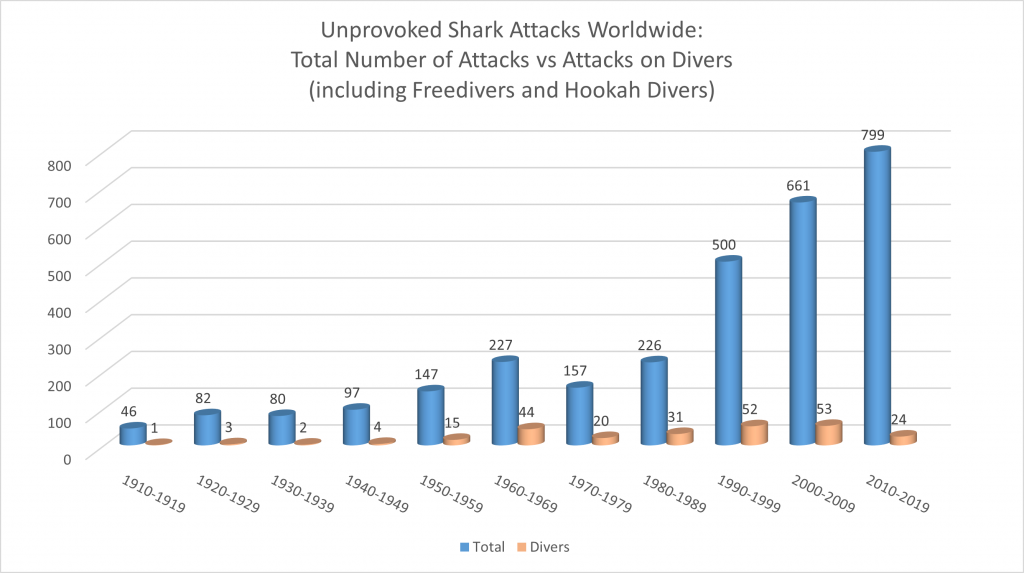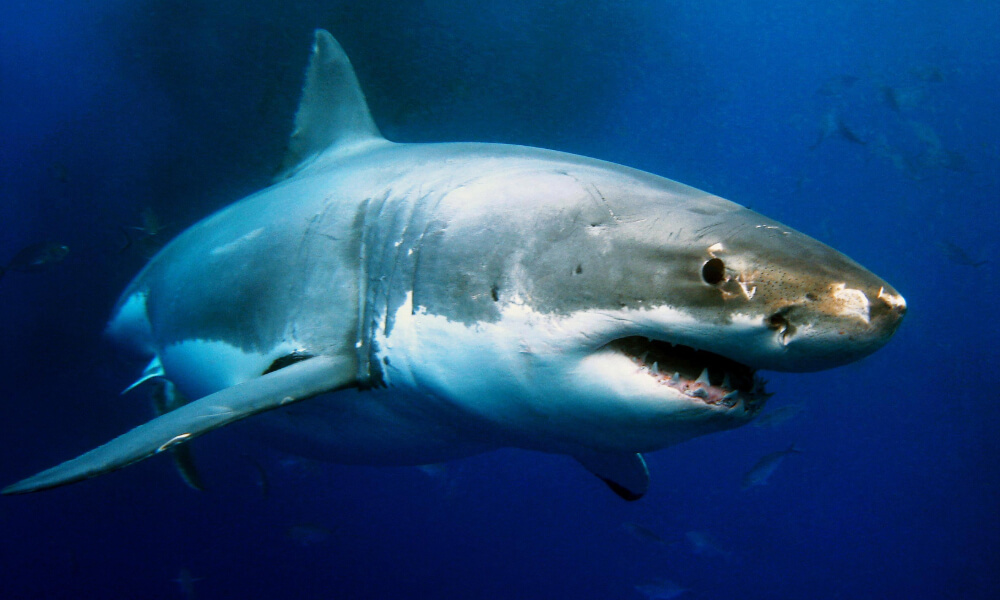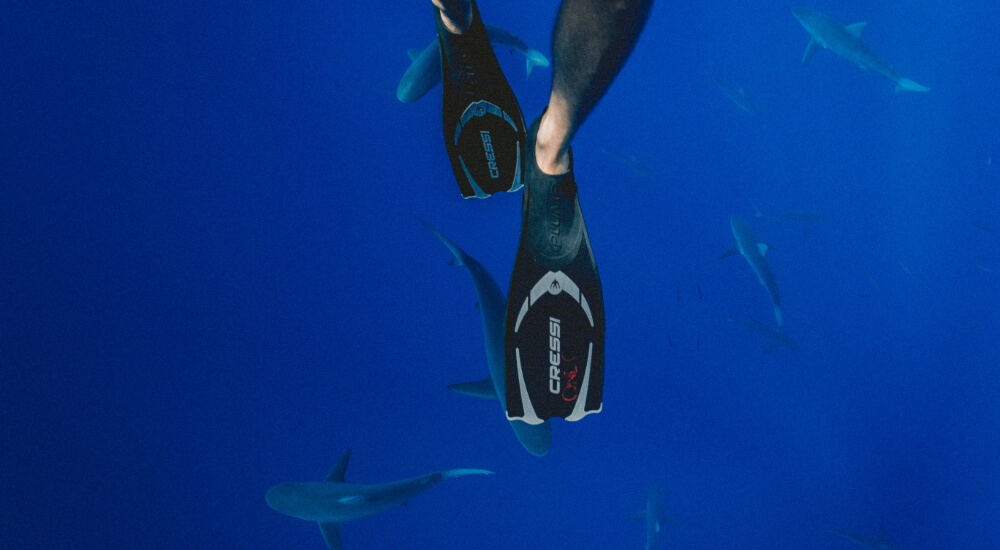Diving with sharks is high up on many divers’ bucket lists, but they don’t exactly have the greatest of reputations. Attacks on surfers are common news, but what about scuba divers? Do sharks attack divers and should we be scared to get into the water with them? Let’s have a look at the statistics and what the experts are saying.
Do Sharks Attack Divers?
Yes, sharks do attack divers, whether provoked or unprovoked. However, attacks are extremely rare, as sharks don’t view scuba divers as a particularly appetizing prey. As such, diving with sharks is not considered a dangerous activity, although some encounters can pose more risks than others.
Most sharks are cautious of divers although, over the years, sharks have become bolder around people because of baiting. Since some dive operators use fish to attract the sharks, the latter may associate the arrival of the dive boat and the splashes made by scuba divers with food.
A Look at the Shark Attacks Statistics
According to The International Shark Attack File (ISAF), the only comprehensive database of all known shark attacks in the world, there were 108 cases of shark-human interactions in 2022. Of the total number of alleged shark-human interactions, 57 were unprovoked attacks and 32 were provoked attacks.
According to the same 2022 report by ISAF, of the total number of 108 incidents, only a few involved individuals participating in snorkeling and diving-related activities. Most of the victims were attacked during activities such as swimming/wading (43%) and surfing/board sports (35%).
A report by the Divers Alert Network Asia-Pacific Foundation and Department of Public Health and Preventative Medicine at Monash University on the fatal shark attacks on divers in Australia from 1960 to 2017 shows how statistically safe diving with sharks is. Of the total 187 shark attacks recorded over the 57-year period, 112 victims were snorkelers, 62 scuba divers, and 13 were using a surface-supplied breathing apparatus.
The attacks resulted in 28 deaths, most of the victims being snorkelers (13), followed by scuba divers (8) and divers using surface-supply (7). The same report notes that shark attacks on divers represent only 3% of the total number of diving-related fatalities recorded from 1960 to 2017 in Australia.
Past and Future Trends
As the worldwide human population and its interest in aquatic recreation continue to rise, the number of shark attacks is also expected to rise, as it is highly influenced by the number of people entering the water.

Data from the International Shark Attack File (Note: Some decades may include incomplete data, either because of unreported attacks or the lack of funding to support the ISAF during certain periods in time.)
Where Do Most Shark Attacks Happen?
The majority of the unprovoked shark attacks worldwide in 2022 occurred in the United States (41) followed by Australia (9). Florida tops the charts for worldwide unprovoked attacks with 16 cases. In fact, the state’s New Smyrna Beach is dubbed as the shark attack capital of the world. Florida is followed by New York with 8 cases and Hawaii with 5 cases. Other nations – including Egypt, South Africa, and Brazil – reported only a few cases of shark attacks. Five of the total number of 57 unprovoked attacks resulted in fatalities.
In the United States, more shark attacks occur in the Atlantic Ocean than in the Pacific Ocean. A reason for this may be the water temperature, as more attacks tend to occur in warmer water and during warmer months when beachgoers and water sports enthusiasts head for the waters.
What Sharks Attack Humans?
There are over 400 species of sharks living in the world today, but most of these species are found outside the usual diving areas. Furthermore, only a few of these species can be considered real threats to humans. The species involved in most of the fatal and non-fatal shark attacks worldwide are great white, tiger, and bull sharks. These species of sharks tend to be very territorial, and some of the attacks are simply warnings to get out of their space.
Incidents of shark-human interaction have also been attributed to the blacktip, requiem, sand tiger, wobbegong, spinner, bronze whaler, oceanic whitetip, hammerhead, blue, shortfin mako, nurse, and sandbar sharks, but with fewer recorded attacks and most often resulted in minor injuries.
Which Shark Has more Attacks on People than any other Type?

The great white shark (Carcharodon carcharias) has been reported to be involved in the majority of attacks on humans. It is the world’s largest predatory fish and can weigh up to 1,900 kg (4,200 pounds). Great whites are curious creatures that are believed to sample bite their victims in search of new potential prey. Biologists point out that many of the attacks are just cases of mistaken identity.
Great whites usually release their victims, as human meat is not something they particularly like. Therefore, an attack does not always result in a fatality and no, they’re not as menacing as depicted in the movie Jaws. They are usually found in the pelagic zone or open waters but sometimes come close to shore which is why there are so many recorded attacks on surfers.
Why Do Sharks Attack?
The reality is, most sharks are just as – if not more – scared of people as some people are scared of them. The number of worldwide attacks has increased over recent decades, but the reason for this is tourism. Each year, more people get engaged in water activities which only means they’re invading the sharks’ “home”.
There are, of course, other reasons why these predators attack, one big reason being hunger. Some species feed on large marine animals, so humans can look like their regular prey. It’s a fact that most sharks attack those partaking in a board sport, most often surfing. From below, a human on a board looks just like a seal which is among sharks’ favorite prey. In addition, surfers make splashing noises that a shark may mistake for a struggling fish. Sometimes, a shark will bite if it chases its prey and a human gets in the way of their food.
Sharks may also attack when provoked. A provoked attack is defined as any physical contact that resulted from the pursue, grabbing, cornering, striking or any other form of harassment inflicted upon the shark by a human. Sometimes, humans inadvertently provoke an attack.
Are Sharks Attracted to Period Blood?
A question often on the lips of women participating in water sports is whether or not sharks can smell period blood. Sharks are famed for their keen sense of smell, but new research showed that this may be just a myth and they are not necessarily better sniffers than other fish. But even if they indeed have a heightened sense of smell, menstrual fluid is still not a trigger, as it contains more than just blood and is released by the human body in small quantities over a number of days. Scientists point out that sharks are far more interested in the amino acids from the blood and guts of marine animals.
Is Shark Cage Diving Safe?
A popular option among those that want to get up close to the great white sharks is cage diving. There are no reported fatalities as a result of cage diving, so if we were to use this as a reference point, we could state that cage diving is safer than recreational diving. However, a number of cage diving incidents that could have ended in a tragedy have been recorded in different parts of the world as a result of unmet cage diving regulations. These incidents often occur when baiting is done on, over or too close to the cage.
One event took place on a submerged dive cage of the luxury vessel Nautilus Explorer. After being lured near the cage, a 15-foot great white known as “Milana Arnone” became trapped in the cage with the divers, severing the divers’ air supply. Luckily, the animal and the divers were freed from the cage with no injuries, but this and other similar incidents have raised the question of whether or not cage diving should be outlawed.
How to Avoid a Shark Attack while Scuba Diving
- Understand the environment. If you’re diving in an environment where the shark’s main prey is located, there is a risk of being mistaken for a large animal such as a seal.
- Avoid diving at dawn or dusk. Many sharks feed at dawn and dusk. Sharks that are typically timid and keep their distance from divers can show signs of aggression when they’re in the hunt for food.
- Avoid murky waters. Diving in water with low visibility makes it harder for you to keep an eye out for sharks and sharks may have difficulties differentiating between you and their prey.
- Learn their behavior. Do some research before your dive on shark behavior specific to the species you are likely to see in the region. Learn to spot the changes in their behavior that may show an incoming attack. Warning may include fast bursts of speed, lowered pectoral fins, side-to-side head movements, and jerky movements which are all indications that the shark is feeling stressed. However, not all sharks give out these signals before they attack.
- Enter and exit the water quietly. Enter the water making as little noise as possible and descend to deeper water as sharks are known to feed on animals in distress at the surface. Seals – a tasty prey – also spend extended time at the surface. At the end of the dive, avoid spending unnecessary time surface swimming and board the boat directly.
- Remain calm. When diving with sharks, it’s important to swim calmly as erratic movements can draw their attention.
- Stay close to the reef wall or seabed. Diving experts recommend staying in these areas to avoid being exposed or pulled away from your group by the currents. The water column and the surface of the water is where the majority of sharks hunt.
- Don’t follow sharks. Never approach a shark from behind because if it spots you, it will see you as a predator and attack in self-defense.
- Don’t wear shiny materials. Sharks are attracted by shiny things which is why you should avoid scuba gear that’s too flashy to avoid being mistaken for a marine animal.
Bottom Line
Over the years, sharks have gained quite a bad reputation. In reality, they’re most often the victims. It is estimated that up to 100 million sharks are killed by humans each year through commercial and sport fishing. In their natural habitat. In contrast, sharks kill a few dozen people each year after the latter enter what it is rightfully the sharks’ space. Shark attacks are rare on any group of people, whether they’re scuba diving, fishing, or involved in any other water activity.

Tony Street says:
I agree with all the above. As a diver for 30+ years, I have seen many sharks and accidentily became up close and personal with four. On these occasions, we looked each other in the eye(s), paused, and after thinking things over went on our separate ways. The thing that amazes me was that neither one of us panicked, we just seemed to acknowledged each other and knew who owned the place.
Kelly Moss says:
Absolutely agree, done a lot of diving around sharks over the years and calm is the name of the game. They are just as or more scared of you than you are of them. As long as you are smart and stay calm more than likely you will never have an issue.
Elizabeth Good says:
I too agree, and in fact have dived with more sharks than anything else (I have several pretty cool videos – https://www.youtube.com/channel/UC8oMPIPb6tVsZgI2e76Z69Q is my “station”). You do need to know behaviors and also pay attention at all times, but only once have I had to bump one in the nose for erratic behavior that had gotten too close – and it had a crazy eye that surely didn’t work. Can’t blame it. Check out the “Friendly Little Lemon Shark” if you want to see how curious, amazing, and how “up close” they can get. It’s pretty amazing – have had several media companies purchase some footage even. They are amazing, formidable, wonderful, awe-inspiring creatures and deserve our respect for them and their territory. Keeping that in mind can help keep a diver safe.
Steve Roderick says:
does anyone that use the electronic or magnetic shark deterrent devices have any feedback. unfortunately i dive in an area of murky waters where seal populations are increasing?
Uber Rox says:
This, of course helps, especially in murky waters. Sometimes these devices can draw the fish to you. It’s really a game of luck and experience. The donts: no shiny objects, try to be as calm in water as possible, no chum very close to you, try to find a better dive spot, as the murky waters are a definite problem. When you can’t see, you can’t avoid. A fish coming round in murky waters is like a human, surprised and usually ready to bite or make sudden moves. Be safe, my friend. Use common sense above all else. I was born and raised in Santa Monica. Lots of seals and great whites around the coasts.
Waco Merchant says:
Agreed. I enjoyed your article. People always make things out to be worse than it is. It’s important to learn about the things we fear and to get out of our comfort zone, thus becoming more confident and realizing we create our own fear.
What we need to understand, is that we are in their domain or house so to speak. No different from a bear in the woods. Don’t poke the bear…
Learn, enjoy and respect their environment. It’s a big ocean. Enjoy it?
Anthony N Trujillo says:
I absolutely agree. As a spearfishing, we are always looking out for sharks or fending off. It also depends on the type of shark and it’s behavior. Knowledge and not fear is your best defense. You panic and loose control, your chances of being attacked more than triple.
If that’s you, stay home.
Khao Lak Explorer says:
Great article, almost got eaten by a shark in Australia, was following a pod of whale. Shark are usually not aggressive.
Ron Robertson says:
Are they attracted to bright yellow gear? Just realized I bought goggles, and fins with yellow as I had my gear stolen. lol
José Truda Palazzo Jr. says:
I think that there’s a clear need to differentiate “attacks” on divers doing spearfishing from the rest… I suspect these will be the largest % of incidents.